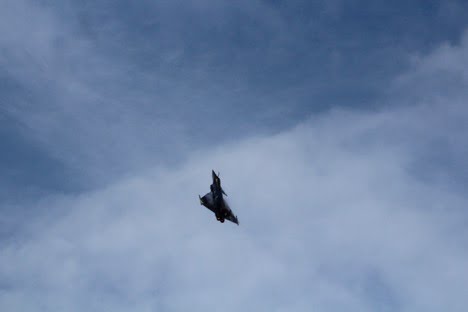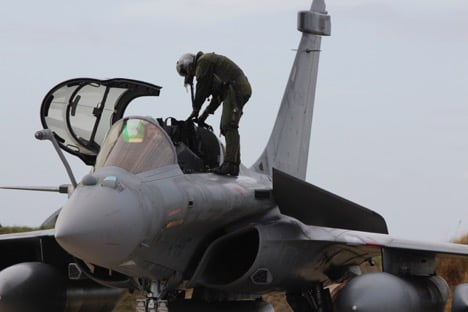By Pierre Tran
Paris – Dassault Aviation played the host for an Oct. 8 ceremony for hand over of the first Rafale fighter jet to India, signaling a close military and industrial tie France seeks to deepen amidst stiff competition from Israel, Russia and the U.S.
The presence of Indian defense minister Rajnath Singh and his French counterpart, Florence Parly, pointed up the political significance of the deal, worth some €7.9 billion ($8.7 billion). The two ministers were due to hold in the evening a bilateral meeting and working dinner at Brienne House, the ministerial office in the capital.
India was one of France’s “principle strategic partners ,” as could be seen by Singh’s attending the delivery, the French armed forces ministry said in an Oct. 8 statement. The French and Indian defense ministers would discuss bilateral cooperation and security in the Indo-Pacific region.
The first Rafale was delivered last month, but the ministers flying down to Dassault’s plant at Merignac, near Bordeaux, point up the political capital invested in the Rafale deal.
That formal event will be held just 10 days ahead of Diwali, a five-day Hindu festival, when lamps, lanterns and candles are lit to mark victory of light over darkness, good over evil. India will be guest nation when France holds its book festival next March.
“This is very important,” said Tara Varma, policy fellow and head of the Paris office of European Council for Foreign Relations, a think-tank. The hand over is the “concrete realization” of a deal which took years to seal, after India switched in 2016 to a direct order for 36 Rafale and dropping acquisition of 126 fighters after holding a tender for medium multi-role combat aircraft (MMRCA).
There have been allegations of corruption on the Rafale deal, which India and Dassault have denied.
France is in talks to sell more Rafales to India, looking to an announcement to be made in January when French president Emmanuel Macron visits India, business website La Tribune reported Oct. 7.

Macron’s visit will be his second trip to India in three years, pointing up the significance of ties to New Delhi, Varma said.
That presidential visit may reflect French hopes but it is not clear the Indian air force will meet that expectation, she said. India added last year a further €5.6 billion to the defense budget, reflecting the need for anti-submarine warfare and combat helicopters, as well as more fighter jets,
The Indian navy seeks to acquire 57 carrier-based fighters, while the air force seeks a further 110 fighters.
France wants to be close to India, while New Delhi hedges its bets by buying arms from Israel, Russia and the U.S.
Israel is active in India and will supply equipment, including missiles, Varma said. The Indian air force will be armed with other weapons besides the Scalp cruise and Meteor long-range missile, she said.
Russia has supplied MiG and Sukhoi fighters to India, and has signed a deal for its S-400 surface-to-air missile.
The U.S. has shipped P-8 maritime patrol aircraft, and Apache attack and Chinook transport helicopters to equip the India services.
The Rafale will be fitted for flying nuclear weapons, Indian business daily Economic Times has reported.
The delivery of the Rafale comes after Pakistan shooting down in February an Indian F-16 and capturing the pilot. The release and hand over of the Indian pilot helped calm some of the tension between the two nations long locked in regional dispute.
That armed clash raised Pakistan to the same high level of threat to India previously held by China, Varma said.
India and France foster close relations, including cultural ties. Macron met Modi in August at prestige-laden Chantilly castle for bilateral talks just ahead of the G-7 summit, to which the French president had invited the Indian political leader.
Those moves signal a “strategic partnership” of 21 years, an Indian official said.
Dassault has given “significant support” to India’s education and science policy by setting up an engineering center, a Dassault skill academy, and a vocational training program dubbed Aeronautical Structure and Equipment Fitter, the company said in a statement.
Dassault has also set up an assembly plant at Nagpur, central India, with its Indian joint venture partner Reliance. That site will build parts for the Dassault Falcon business jet and could allow final assembly for the Rafale, if a deal were struck.
Those investments are part of the offset deals required by the Make in India and Skill India programs set by New Delhi, seeking to boost the domestic economy.
India is a major market for weapons from the west and Russia.
The Indian naval market continues to grow, as the re-election of Modi in May led to early steps of a competition for six more diesel-electric boats, with challenging requirements.
French shipbuilder Naval Group has replied to India’s expression of interest in selecting a Strategic Partner to build six more submarines under the Project-75 (I) project.
Naval Group sold six Scorpene submarines in 2005 in a deal reported to be worth $3.5 billion.
The French company filed a “fully compliant and adapted response,” Soumyajyoti Basu, Naval Group’s country sales director for India, said Oct. 2. Indian shipyards have also submitted response to the expression of interest to be a local Strategic Partner.
India has set requirements for a stealthy submarine larger than the Scorpene, capable of land attack missiles, and extensive technology transfer for local assembly, he said.
The Indian government said in a June 20 statement the navy would have an option for six more submarines under the P-75 (I) project.
India will likely attract bids from Germany, South Korea, Spain and Russia, along with the French offer. The Indian defense ministry and navy will review the submissions, draw up a short list and send out a Request for Proposal.
Naval Group will pitch its F-21 weapon in an Indian tender for 98 heavy torpedoes, with a competition expected to be launched by the end of the year.
The shipbuilder is also offering extensive service packages.
The Indian Navy commissioned Sept. 28 its second Scorpene class submarine, the Khanderi, which follows the first of class Kalveri, commissioned in December 2017.
The Kalveri was delivered late, reflecting the need to regain expertise after a decade-long gap in building submarines. There was also tardy supply of subsystems and steel.
Delivery of the remaining four Scorpene boats is expected to be every nine to 12 months as from last month. The Indian navy will set the date for formal delivery and commissioning, as much depends on the monsoon, which hits the gulf off Mumbai on the Arabian sea.
India flies eight Poseidon P-8 anti-submarine warfare aircraft and ordered in 2016 four more units. An acquisition of a further 10 units has been approved.
European missile maker MBDA will supply missiles for the Indian Rafale and Mirage 2000H fighter jets, in a deal worth €710 million.
The Rafale will be armed with Mica air-to-air, Scalp cruise and Meteor long-range, air-to-air missiles. The Mica will also arm the upgraded Mirage.
The Indian joint venture between MBDA and Larsen & Toubro will build those missiles.
“The MBDA missile warning system is based on an infrared detector from Lynred,” said David Billon-Lanfrey, strategy director at the specialist in infrared technology.
In the Indian drive for local offset, the European missile builder signed Sept. 12 a memorandum of understanding with Bharat Dynamics Ltd, with the Indian partner taking up final assembly, integration and test of the Mistral and an advanced short-range, air-to-air missile. The latter, dubbed new generation close combat missile, will arm the Jaguar fighter.
Hindustan Aeronautics Ltd will integrate the Mistral on the Dhruv helicopter and the light combat helicopter.
In land weapons, an Israeli company, Elbit, and its local partner Bharat won a contract estimated to be worth more than $1 billion in the Trajan project for towed artillery, beating a rival offer from Nexter, a French firm.
Nexter awaits launch of a competition for India’s mounted gun system, a requirement set in 2010. The French state-owned company has teamed with Ashok Leyland to pitch its Caesar truck-mounted 155mm/52 caliber artillery for that prospective tender.
India’s military acquisition is part of its drive to foster domestic industry.
“The overall aim would be to progressively build indigenous capabilities in the private sector to design, develop and manufacture complex weapon systems for the future needs of the Armed Forces,” the Indian government said June 20.
“This will be an important step towards meeting broader national objectives, encouraging self reliance and aligning the defense sector with the ‘Make in India’ initiative of the government.”
The featured photos highlight the Rafale solo display which performed during the celebration of French strategic Forces 55th birthday, Saint Dizier FAF base, October 4th, 2019,
Photo credit: M. Delaporte


